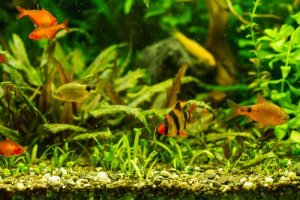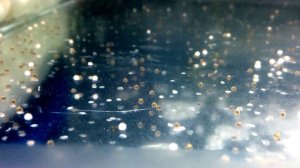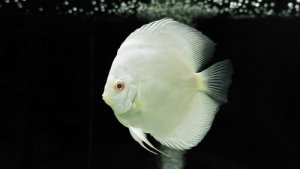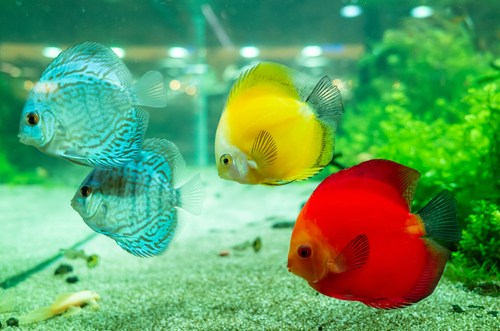
Discuss fish are an attractive addition to any aquarium. However, taking care of your aquatic pet requires understanding this beautiful creature’s various behaviors. Understanding their healthy behavior is easy to learn but learning discus fish behavior before death is also necessary.
These fish can be easy to maintain and live long, healthy lives if given the right environment. However, your discus fish can get sick if their environment is not suitable. Noticing any change in their behavior can help you save your pet’s life. Here are some common discus fish symptoms to look out for.
8 Common Signs And Symptoms Of Discus Fish Behavior Before Death
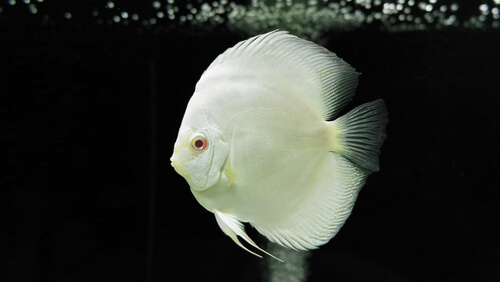
1. Trouble Breathing
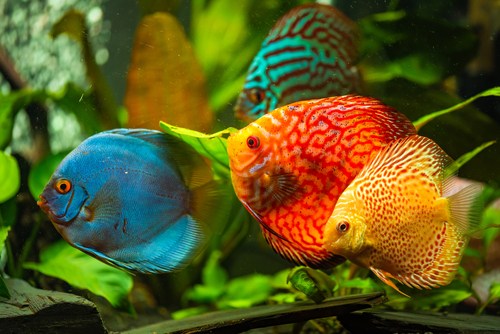
Discus fish in healthy conditions do not gasp for breath or breath rapidly. Should you find your pet at the surface trying to gulp air or their gills moving rapidly, it could be that they are not getting enough oxygen. This could be detrimental to your fish as this is typical fish behavior before death.
Rapid gill movement is usually an indicator of stress in your fish. This stress can be brought on by specific diseases such as flukes, mites, ich, or other tank stresses. When tanks are not regularly maintained, toxins build up, depleting the oxygen supply. Check water parameters regularly to keep fish safe.
2. Sluggishness
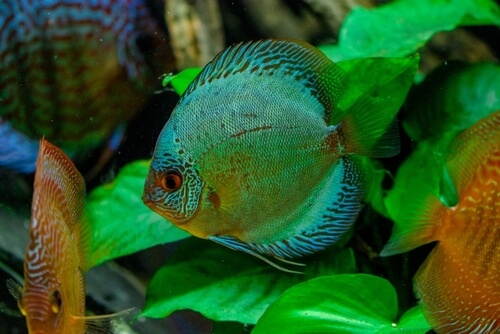
As your discus fish ages, you will notice it starts to slow down and becomes less active. As your senior friend gets close to the end, their bodies deteriorate. In addition, their energy levels drop due to eating less and taking in less oxygen.
With younger discus, you shouldn’t see it sitting around for prolonged periods unless it is sleeping. Usually, active fish suddenly becoming sluggish could be an indication that they aren’t doing too well. The two main contributors to your aquatic pet’s sluggishness are illness and compromised water parameters.
Improper water temperature is extremely harmful to discus fish and can make them inactive or sluggish. Discus prefer much warmer temperatures of up to 86 degrees Fahrenheit. Temperatures that are too low can lead to sudden discus fish death. Check your fish for parasites or other illnesses if your water temperature is not the issue. Unwell fish typically move around less as their energy levels are not quite where they should be.
3. Bloating
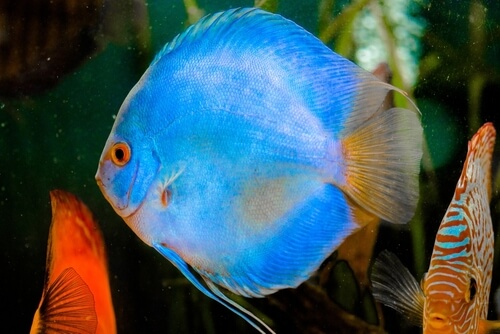
Bloating in discus fish is a common symptom and usually looks like they have swallowed a marble. This symptom may occur for any number of reasons, but overeating is the leading cause of bloating. Discus require small, regular feedings rather than large ones. Blockages in the intestine can occur due to indigestion, causing your fish not to pass the waste.
Another reason your fish is swelling could be due to an illness that may have been present for a while. Your discus most likely has a bacterial infection such as Aeromonas. Sudden bloating of the body is one of the causes of discus fish death. Adding Epsom salt to the water is one of the easiest ways to cure bloating.
4. Loss Of Appetite
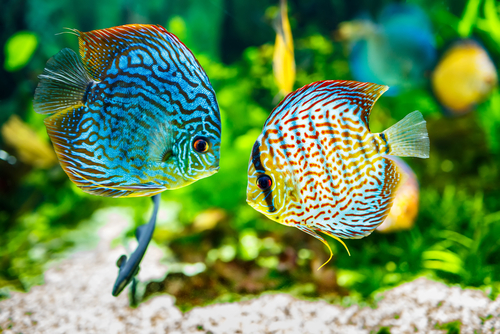
While discus fish can go long periods without food; not eating indefinitely should cause concern. Poor water quality or disease could be causing your fish stress which forces it not to eat. Your pet’s body starts breaking down when it stops receiving the required nutrients. Prolonged periods of no appetite is a typical discus fish behavior before death.
Check out the water parameters when your discus shows a loss of appetite. Water that contains too much ammonia and nitrates is highly toxic to fish. Tanks with large amounts of toxins compromise the amount of oxygen fish get. Compromised oxygen may cause infections in your discus fish. If the water quality appears ok, observe your pet for illness or visit your vet for a checkup.
5. Erratic Swimming
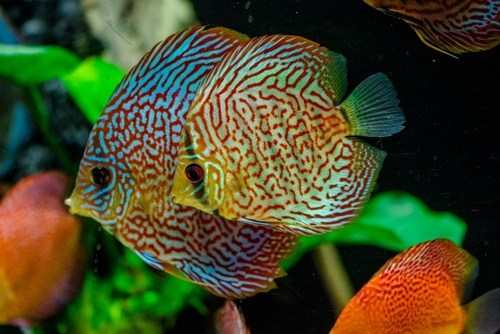
You will find that your discus is very active during the day. They love to eat, so they are generally faster during feeding. But it may occur that you suddenly witness erratic swimming from your fish. Usually, these aquatic creatures display such signs when they are feeling discomfort or stress.
There can be a range of factors contributing to your pet’s stress. The most common reason they swim erratically is parasites and poor water quality. If your fish has parasites, they will swim around quickly to try and shake them off. In addition, poor water quality or temperature could be causing your fish distress. Water that is not optimum is one of the leading causes of discus fish death.
6. Loss Of Color
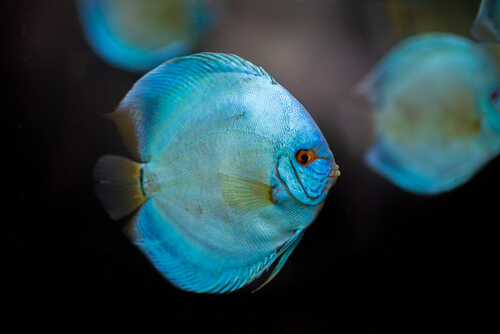
Color loss in discus fish can indicate severe stress. Inadequate nutrition, poor water quality, overcleaning the tank, disease, aggressive tank mates, overcrowding, new environments, and other factors can all contribute to stress.
When you see the color of your discus changing, it is crucial to address it quickly. Stress in fish weakens their immune system leaving them susceptible to illness. If you have an older fish, it could just be the aging process that is causing your treasured pet to lose color. Older fish tend to get less oxygen and sunlight, which eventually causes their color to fade.
7. Clamped Fins
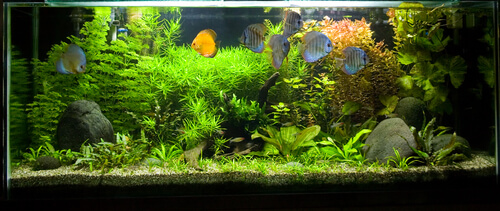
Clamped fins are visible when your discus fish’s fins are tightly gripped against its body. This type of behavior is always an indication of a problem. The cause may not be limited to just one thing, however. When your discus displays clamped fins, it can be a reaction to the difficulty it is experiencing from these other problems.
Observing your discus fish to determine what could be causing this behavior is a good idea. First, examine your fish for the usual stresses – water quality, temperature, parasites, disease, and bullying. This should be your base to determine if your fish needs further treatment.
Clamped fin will correct itself once the issue is addressed. While clamped fin may not be one of the direct causes of discus fish death, don’t ignore clamped fin. The underlying causes of clamped fin could be deadly to your discus.
8. Buoyancy Issues
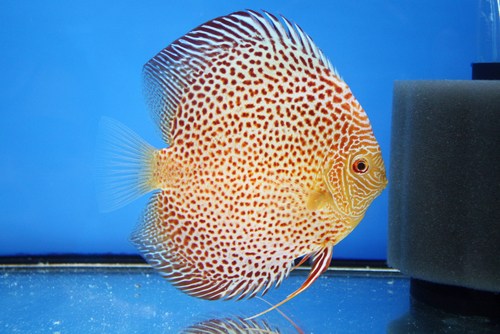
Buoyancy issues are prevalent in discus fish and can be fixed easily. A discus with poor buoyancy control will swim upside down, backward, or sideways. Your pet is kept upright by its swim bladder. However, when your fish has issues such as swim bladder disease, it will experience problems staying buoyant.
One of the simplest solutions to repair this problem is feeding your discus peas. Diet plays a big part in swim bladder problems. Sometimes the food you are providing your discus may not be adequate for its nutritional needs. Fiber is needed to fix swim bladder problems, and peas are an excellent source of it. Overeating, parasites, or bacterial infections are other reasons your fish could have swim bladder issues.
How To Determine If Your Discus Fish Has Died?
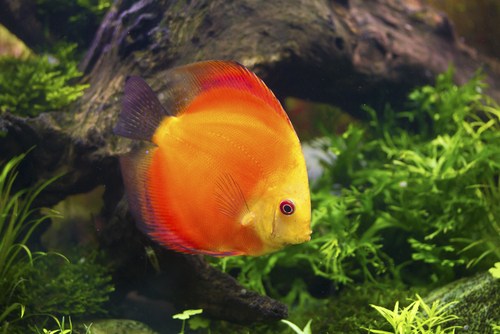
If you’re new at owning discus fish, you may be unable to tell if your beloved pet has passed on. And this is ok. With time and experience, you will read your treasured friend much more easily. Here’s what to look out for when you aren’t sure:
- There is no gill movement
- The fish is floating around lifelessly
- Sunken in and grey eyes
- Tanks mates have started feeding on it
- The discus has become pale
What Are Treatable Discus Conditions?
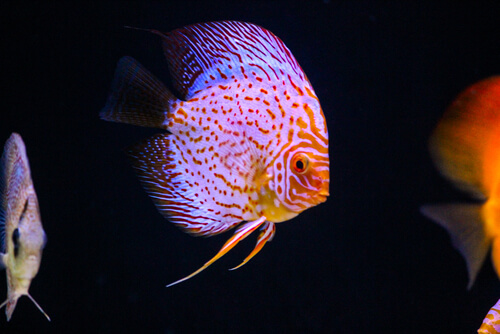
From time to time, you will find your discus has difficulties with their health. Fortunately, not all these conditions are detrimental to your fish. These are common treatable diseases in discus fish:
1. Discus Plague( Black Death Disease)
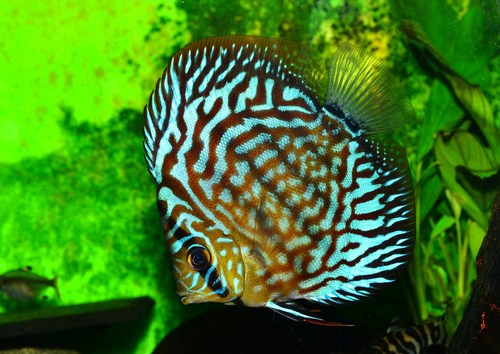
Discus Plague is a viral disease that spreads quickly among fish and is highly contagious. This disease is airborne, so it can infect other tanks in the room. Urgency is needed when dealing with discus with this illness. You will need to quarantine the fish in a separate room to eliminate discus plague getting into the room’s air. Immediately perform a water change in the tank.
Usually, fish with Black Death Disease produce excessive amounts of mucus that makes water smelly and cloudy. Discus that survive this disease should be kept separately as they may be infected with discus plague for at least six months.
2. Popeye
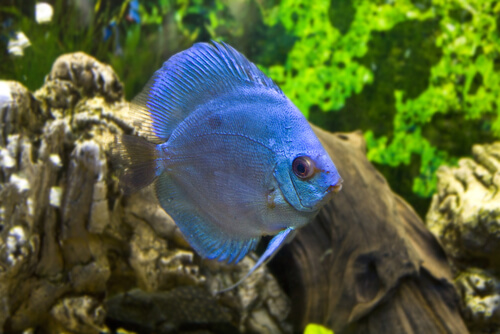
A common indication of Popeye disease is eye swelling and bulging from its socket. This is due to the pressure of the fluid leaking into the socket. Popeye can affect one or both eyes and is dangerous to your discus fish’s eyesight. If not addressed early, your pet could experience ruptured corneas or complete eye rupture.
Popeye can be subtle at first, but once it gets worse, it becomes very noticeable. It may not be fatal at first, but if left untreated, it can spread and may result in the death of your aquatic friend. This disease usually results from poor water conditions or injury. Improve the water quality of your tank to help your fish heal. If your discus fish has Popeye due to injury, the only solution is to wait for the wound to heal.
3. Ich
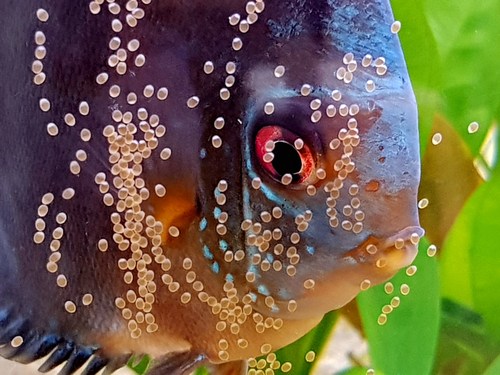
Ich is a parasite that attaches itself to your discus fish. You will likely see white spots on your fish when they have ich. Your discus will try to remove these parasites by rubbing against objects, or you will likely see it banging against the tank.
Ich can be easily removed with tweezers, increasing the tank temperature and adding malachite green to the water. However, if these parasites are left untreated, they can be fatal to your discus as they slowly eat away at your fish’s body.
Final Thoughts
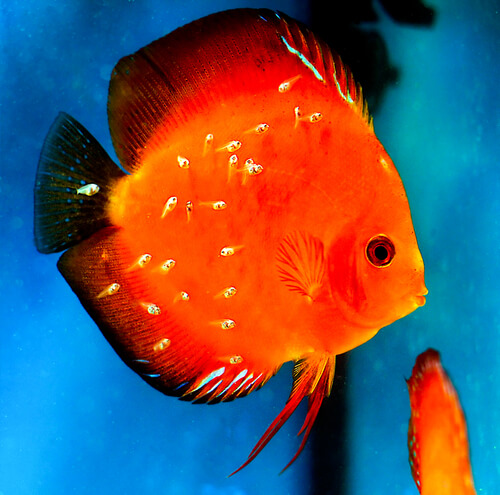
When you purchased your discus fish, you probably never considered all that goes into owning one. Well, like all things in life, you need to take the time to learn about what they require. You may not realize this, but it does not take much to keep them alive. You just have to ensure your pet gets the best care right from the start.
Good nutrition, clean water, and a stress-free environment are what you should aim for to help your aquatic friend stay healthy. If your fish still displays common discus fish behavior before death, even after taking the correct steps, consulting your vet might be necessary. There could be something you aren’t seeing that is affecting your pet.


